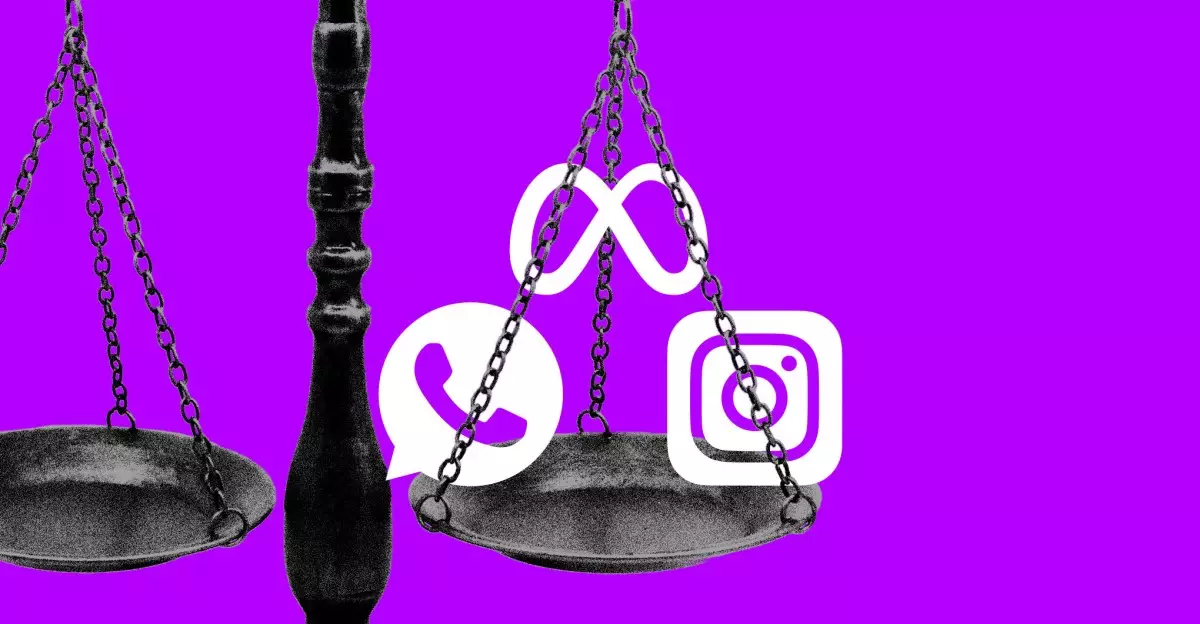The courtroom drama unfolding in the FTC v. Meta trial is not merely a legal battle over acquisitions; it encapsulates the intense scrutiny faced by some of the largest tech companies today. Mark Zuckerberg, the mastermind behind Meta’s sprawling empire, took the stand amidst a plethora of allegations that his company had engaged in anti-competitive practices. As he seized the opportunity to defend his record, the tension in the courtroom was palpable. One of the moments that stood out was when Zuckerberg, in response to a question from Meta’s attorney regarding his feelings about the $19 billion spent on WhatsApp, flashed a confident grin and stated, “I’d do it again.” Such statements not only convey his unwavering commitment to his decisions but also illustrate a deeper strategic vision that may be misunderstood by critics.
Despite the cavalcade of accomplishments that accompany his acquisitions, Zuckerberg’s remarks also reveal a defensiveness that seems critical in the face of government scrutiny. His assertion that he viewed WhatsApp and Instagram not as threats but as assets indicates a mindset quite different from that portrayed by regulatory bodies. The trial portrays a clash between innovative vision and the rigid frameworks of antitrust laws that often struggle to keep pace with the rapid evolution of the tech landscape.
Unpacking the Government’s Argument
The crux of the FTC’s argument rests on the premise that Zuckerberg’s acquisitions of WhatsApp and Instagram were not about enhancement, but rather a calculated move to eliminate competition. The idea of a “catch-and-kill” strategy has been a prominent theme in the proceedings, with the government depicting Zuckerberg as a tech oligarch determined to stamp out any potential competitors. Zuckerberg’s struggle to refute this narrative further emphasizes a crucial point: the dichotomy between perception and reality in the technology space.
During his testimony, Zuckerberg contended that his rationale for acquiring WhatsApp was drawn from a larger perspective of shifting communication trends. He recognized early on that interaction was migrating away from public platforms like Facebook and becoming more private, which in his view warranted the hefty investment. On the stand, he admitted to feeling that WhatsApp co-founders Jan Koum and Brian Acton were “unambitious,” suggesting that he saw an untapped potential that could be harnessed instead of a competitive threat that needed obliteration.
While examining the intent behind these acquisitions, it becomes pertinent to question the assumptions of the FTC: did Zuckerberg feel threatened by potential competitors, or was he genuinely motivated by the larger vision for Meta’s role in the digital landscape? In answering this, Zuckerberg’s testimonies point towards a belief that WhatsApp, instead of being an adversary, would serve as a vital tool for Facebook to stay relevant.
Strategic Investments Versus Anti-competitive Maneuvers
The testimonies showcased inside the courtroom aired differing viewpoints on the real impact of Instagram and WhatsApp on Facebook’s growth trajectory. Critics and supporters alike view the acquisitions with skepticism and admiration, respectively. Zuckerburg stressed that when he procured Instagram, he envisioned providing it with resources to flourish. The internal statistics presented in court illustrated the growth from a mere 10 million users at the time of acquisition to more than 2 billion today—a feat that many in the industry consider unlikely if Instagram had remained independent.
However, this narrative begs the question: Was Meta’s growth underpinned by legitimate business acumen, or was it the silencing of competition that fueled success? Zuckerberg’s perspective emphasizes the transformative nature of his decisions. He indicated that by allowing Instagram to grow with Meta’s support, the platform could rapidly expand its user base and functionalities, ultimately increasing the utility of the entire Meta ecosystem.
Reflections on the Future of Digital Competition
The testimonies and events from the trial shed light not just on past decisions, but also on the broader implications regarding digital monopolies and competition. As Zuckerberg defended his decisions, he began painting a picture of a future where these platforms could potentially enrich user experience rather than drown them in anti-competitive practices. This narrative contrasts sharply with the regulatory view that seeks to impose limits and reframe market dynamics.
With messaging platforms and social media becoming increasingly intertwined, Zuckerberg’s defense appears intricately connected to the ongoing evolution of interaction in the digital age. The push towards a status-quo approach in regulating tech giants may stifle innovation, failing to recognize the significant role these companies play in shaping communication, entertainment, and commerce.
As the trial progresses, the underlying question remains: is innovation being misconstrued as anti-competitive behavior? As the stakes rise, the tension between regulation and innovation will likely continue to shape the discourse, a reality that all players in the tech arena must navigate thoughtfully.


Leave a Reply